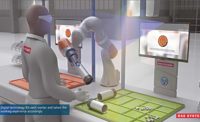Cobots Create Value at Cummins

Headquartered in Columbus, IN, Cummins Inc. manufactures engines, generators, and components for trucks and tractors, such as turbochargers, exhaust systems and filtration products. Cummins engines can be found in trucks, buses, recreational vehicles, construction and agricultural equipment, military vehicles, and even large boats. The company tallied $23.6 billion in sales in 2019.
With more than 90 manufacturing facilities worldwide, the company has a history of deploying innovative technologies. In recent years, for example, Cummins has invested in metal and plastic additive manufacturing equipment, and the company hopes someday to print replacement parts for its products on demand. The company has installed solar panels at 11 of its factories worldwide, and it is using special equipment to capture the energy from hot-testing engines.
Another new technology that Cummins is taking advantage of is collaborative robots. The company sees several advantages to cobots:
- Cobots can take over dull or repetitive tasks that would often pose ergonomic risks to operators, such as uncomfortable wrist or shoulder rotations. By taking over mundane tasks, such as machine tending, cobots free up skilled workers for more value-adding activities.
- Cobots can typically share a workspace with people without the need for safety barriers, leading to more efficient plant designs.
- Because of their built-in safety features, cobots typically have a lower total cost of ownership than traditional industrial robots.
- Cobots are easier to program than traditional robots. In many cases, an operator can program the cobot simply by manually positioning the arm where it needs to go.
By the end of 2019, Cummins had deployed more than 30 cobots at 15 of its manufacturing locations worldwide.
“When we defined the Industry 4.0 framework for Cummins, we committed to embrace and deploy new technologies that would help us solve key quality challenges, and offer a safer, more efficient manufacturing environment,” says Tim Millwood, vice president of global manufacturing for Cummins. “Cobots add significant value in helping us achieve these goals.”
At the Charleston Turbo Plant in Charleston, SC, a cobot from Universal Robots is being used to dispense a retaining compound. It has operated for years without any safety or downtime issues. This application allows operators to perform quality and process inspections within the same operating space as the cobot and has solved many concerns, including safety, ergonomics, quality and downtime issues. Since installing the cobot, the plant has been able to produce 10 more turbochargers per eight-hour shift, because downtime was eliminated.
At the Darlington Engine Plant in Darlington, U.K., a cobot from Universal Robots was installed in early 2018. It has a 2D bar code reader that scans and extracts fuel injection trim codes. This application has solved many quality issues, since the scans must be completed in a sequential order for successful programming.
At Cummins headquarters, engineers are testing an application to use cobots to inspect engine quality. And, at a Cummins Emissions Solutions plant in Survadi, India, a cobot is being used in a pick-and-place operation.
“As I walk through our diverse plants today, I see opportunities for applying collaborative robot technology every few feet,” says Elizabeth Hoegeman, executive director for global manufacturing engineering at Cummins. “Our vision is to steadily increase in cobots over the next several years.”
Looking for a reprint of this article?
From high-res PDFs to custom plaques, order your copy today!





